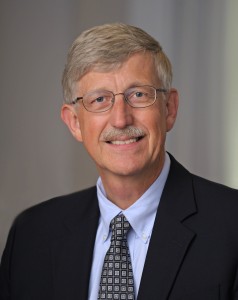As Director of the National Institutes of Health (NIH), Francis Collins combines the personal fortitude of a leader with the analytical understanding of a researcher to oversee the largest medical research institute in the world. Prior to this, Collins successfully directed the Human Genome Project, which was widely considered to be the greatest bioscience research endeavor in history. He is a man of many talents, acquired through an interesting journey to the top.
Born in 1950, Collins developed a childhood fascination with chemistry and mathematics. At the young age of 16, he enrolled in the University of Virginia believing he was destined to become a chemistry professor. He swiftly completed every chemistry and physics course available to him. “I completely ignored biology because it seemed a bit messy to me, and frankly, it is a little bit messy,” Collins said.
After obtaining his B.S. in chemistry, Collins came to Yale to earn a Ph.D. in physical chemistry. Around that time, he enrolled in a molecular biology course that completely changed his attitude towards the life sciences. “So I had a bit of a crisis at that point…I had my whole life planned to become an academic chemist and now this whole field was beckoning to me,” Collins said.
Collins reasoned that he could prepare for research in the life sciences by attending medical school. He received eight years of medical training at UNC Chapel Hill, before he found himself back at Yale researching molecular biology. After learning how to conduct experiments at the DNA level, Collins was prepared for his next job: gene-hunting.
From 1984 to 1993, Collins worked at the University of Michigan to discover the genes responsible for several inherited diseases. There, he worked with a group of scientists who had an ambitious plan to map the genetic underpinnings of cystic fibrosis, a disease characterized by respiratory infection due to abnormally thick mucus. It was a monumental challenge that would truly test Collins’ skills in human genetics. “There was nothing to guide us; we were feeling our way in the dark here,” Collins said.
After five years of intensive hunting, Collins’ team finally discovered the elusive genes. This was a huge moment for the entire field. Collins’ team demonstrated the feasibility of gene hunting, and the versatile methodology behind it—called positional cloning—became an important tool for molecular biologists. Perhaps most importantly, Collins’ success convinced the scientific community of the viability of the Human Genome Project, the NIH’s 15 year plan to map all genes specific to the human race.

Collins, excited to participate in this once-in-a-lifetime project, applied for a grant from the Human Genome Project. But the NIH had other plans for him. “They asked me to lead the Human Genome Project, something I had never considered before,” Collins said. At first, he was hesitant to become a public employee. Nevertheless, Collins accepted this monumental challenge, recognizing that there would only be one Human Genome Project in history.
Collins faced pressures from many fronts. Much of the scientific community thought the project was going to be too expensive. In addition, the manual DNA sequencing system had to be converted to an automated one. Once the technology was finally developed, Collins formed international teams of scientists. Throughout the entire process, Collins served as Project Manager, a leader who coordinated the different teams and solved outstanding problems. “We developed a wonderful sense of camaraderie around this goal, because we appreciated its importance to medicine,” Collins said. Despite the challenges, they managed to sequence the human genome by 2003, two years earlier than planned.
Soon after this accomplishment, Collins received a call from President Obama, and he was promptly sworn in as the Director of the NIH. Initially a student who ignored the “messy” field of biology, Collins now oversees one of the most important institutions in the biology research realm. He says it has definitely broadened his horizons.
Collins is excited to see where medicine will go next in the fields of neuroscience, infectious disease, and immunotherapy. “It has been quite a ride. And there is still a huge frontier out there just waiting for us to explore.”
